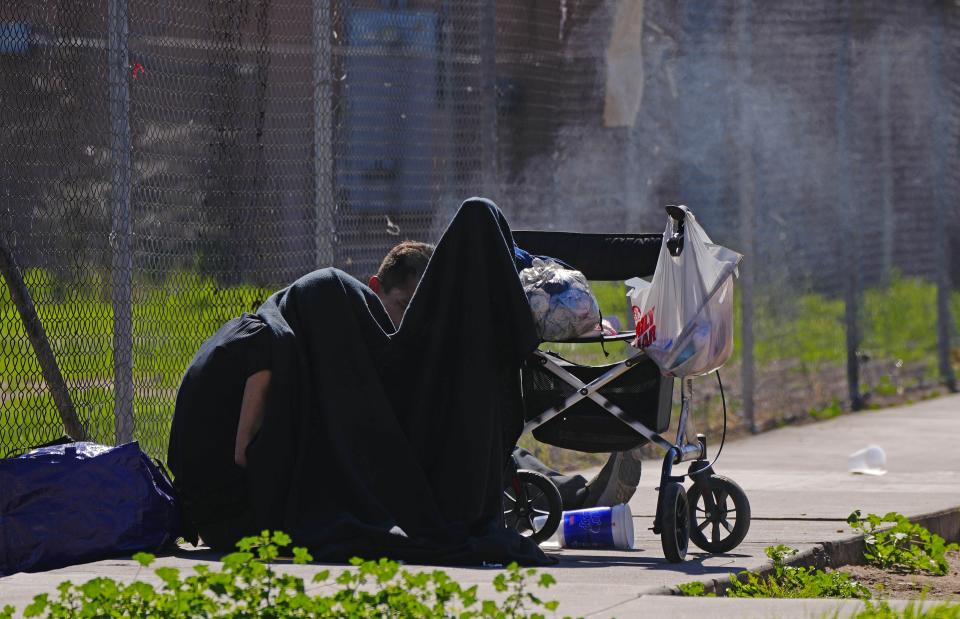Where is all that money going to fight homelessness in Arizona? No one knows
Corrections & Clarifications: An earlier version of the column mischaracterized the source of the $1 billion in annual spending on homelessness.
A recent report has exposed shocking statistics about the state of homelessness in the Grand Canyon state.
The state spends an estimated $1 billion every year on homelessness alleviation, according to the Common Sense Institute — roughly 43% of which is in taxpayer money and the rest private spending.
Yet the number of Arizonans without shelter continues to grow at a substantial rate.
The institute’s report serves as a startling reality check on the massive failure of programs that have deprioritized emergency and transitional services — leaving more and more people in crisis to the dangers of life on the streets.
Homelessness is still skyrocketing
Over the last three years, the number of homeless individuals in Arizona has increased by nearly a third — and it is suspected that the increase may be significantly higher.
Even more worrying, the number of unsheltered homeless, the most vulnerable among them, more than tripled between 2014 and 2023.
Common Sense Institute identified at least 167 public and private homeless service providers employing roughly 9,000 workers and 42,000 volunteers. They reported that’s about the size of the state’s mining and logging sector in terms of work hours.
These organizations are spending more than $47,200 per homeless person each year. That figure is double the median annual rent, and it’s more than half the state’s annual GDP in farming.
Yet, alarmingly, conservative estimates now put the total number of homeless individuals in Arizona at 14,000. A record 7,600 of them went without shelter in 2023.
Rep. Gress has suggested an important fix

So, where is all that money going, exactly?
No one knows for sure — and that is a major problem.
State Rep. Matt Gress, who called the report a “bombshell,” is trying to fix it and working across party lines to provide accountability and transparency when it comes to how taxpayer dollars are spent on homelessness initiatives.
Homelessness isn’t a partisan issue, and neither are the root causes.
One of the largest studies of homelessness in the U.S., of unsheltered people in California, found that more than eight in 10 individuals are struggling with mental health disorders, and two-thirds are using illegal drugs regularly.
Among Arizona’s unsheltered homeless, the number who suffer from chronic substance abuse has skyrocketed by a shocking 153% since 2013.
Research by the Cicero Institute underlines the alarming connections between mental health and homelessness.
Make homeless shelters drug-free zones
Throughout the 1980s, all 50 states created drug-free zones to put a stop to drug dealing and usage in areas where children learn and play. The result was what we now call “Drug-Free School Zones.”
The solution has had a positive impact on drug crimes in such areas, and no one would dream of eliminating the policy.
It makes sense to expand drug-free zones to include homeless shelters and housing units where struggling individuals, including children, can feel safe.
Homeless people need housing: Not jail time for drugs
Drugs exacerbate the challenges facing the homeless by exposing them to criminal predation, attracting criminal activity and chaos that further destabilizes their environment.
Multiple studies have found that crime and drugs concentrate in areas near homeless service areas, so it only makes sense to remove drugs from the equation.
The lives of homeless individuals depend on it.
Arizona should focus on treatment first
Gress’ efforts to offer meaningful change have gained a foothold. He has sponsored legislation called The Arizona Homeless Protection and Drug Control Act, and the conversations it’s generated have been encouraging.
The act would create commonsense drug-free zones, require service providers that accept government funding to be transparent about their spending, reprioritize emergency and transitional housing, and focus on treatment-first approaches to offer struggling Arizonans a second chance at a flourishing life.
Those who choose to deal drugs or knowingly allow drug trafficking in drug-free homeless service zones would face increased penalties for putting homeless individuals and those who serve them at grave risk.
Lending further support to the push, our recent polling shows a significant majority of Arizona’s voters support greater action against homelessness and drugs. That includes Democrats, Republicans and independents.
There is reason to be hopeful that real relief could be coming — and it might just arrive this year should lawmakers act.
Devon Kurtz is policy director of Cicero Institute, a research and public policy organization. Stefani Buhajla is the institute's communications director. Reach them at devon@ciceroinstitute.org and stefani@ciceroinstitute.org.
This article originally appeared on Arizona Republic: Homeless crisis is getting worse because Arizona ignores root causes

